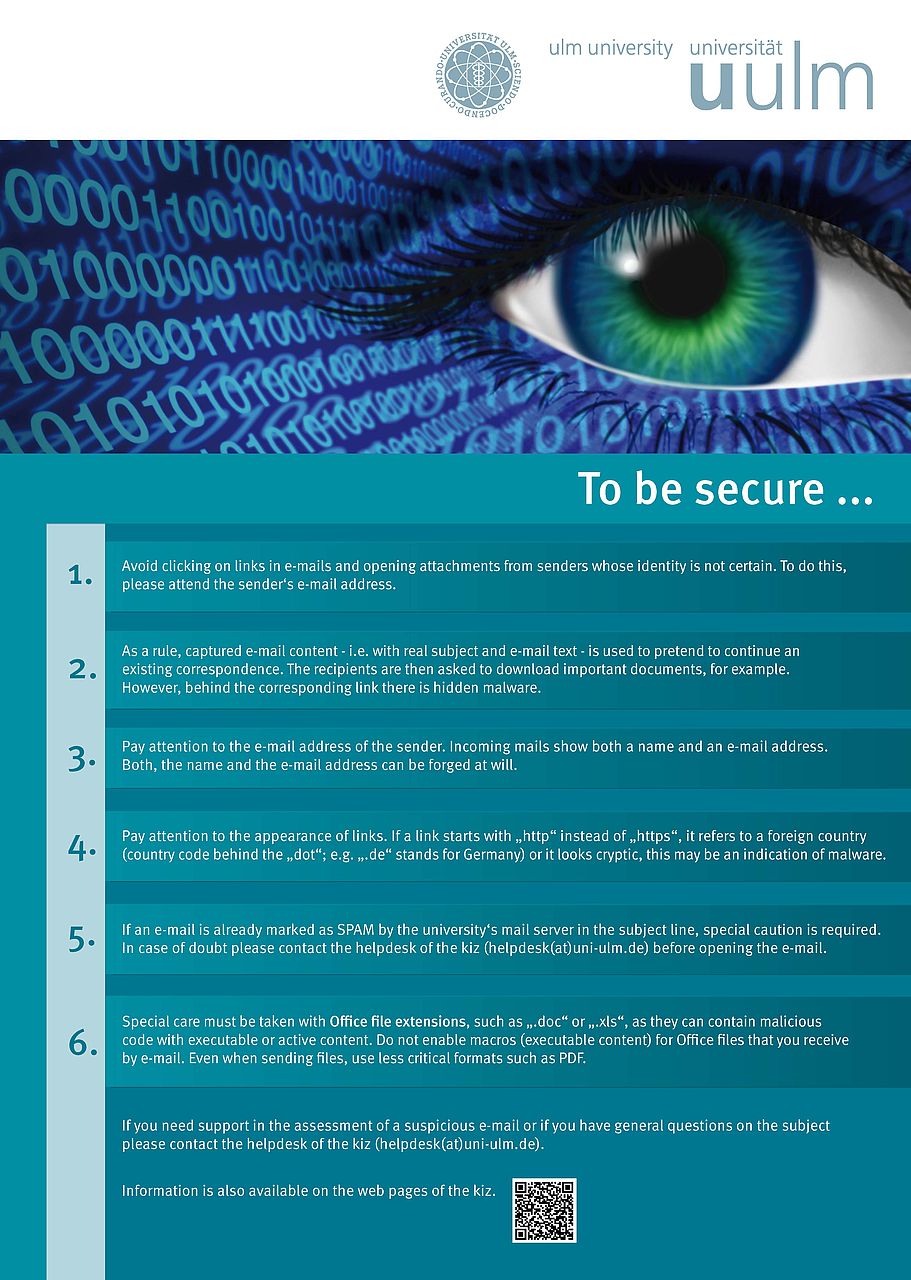Guide to safe handling of e-mails
Central spam & virus filter
All e-mails which arrive at the kiz mail server are automatically scanned for malware and unwanted mass advertising (spam). The behavior of the central spam filter can be influenced by the settings of the e-mail account (e.g. filtering by blacklist) and especially helps to sort out the irrelevant and annoying e-mails from the beginning.
If the scanner detects malware (viruses), acceptance is refused and the sender receives a notification that the e-mail could not be delivered. However, please remember that not all malware is detected by the virus scanner, and reliable protection against phishing is not possible. Malware can also be introduced via another (private) e-mail account (e.g. Gmail, GMX, Web.de), which you can access from the campus network. Therefore, please also activate the virus scanner and spam filter in the settings of these mail providers.
Correct behaviour when dealing with e-mails
Infections via e-mails or their attachments are the most important gateway for computer viruses. Technical measures such as virus filters and security updates do not offer complete protection and must be supported by problem-conscious and careful user behaviour. You can also find out more about this topic from the Federal Office for Information Security.
We have briefly summarized the most important information for you (also available as a flyer for download):
- Avoid clicking on links in e-mails and opening attachments from senders whose identity is not certain. To do this, please attend the sender's e-mail address.
- As a rule, captured e-mail content - i.e. with real subject and e-mail text - is used to pretend to continue an existing correspondence. The recipients are then asked to download important documents, for example. However, behind the corresponding link there is hidden malware.
- Pay attention to the e-mail address of the sender. Incoming mails show both a name and an e-mail address. Both, the name and the e-mail address can be forged at will.
- Pay attention to the appearance of links. If a link starts with "http" instead of "https", it refers to a foreign country (country code behind the "dot"; e.g. ".de" stands for Germany) or it looks cryptic, this may be an indication of malware.
- If an e-mail is already marked as SPAM by the university's mail server in the subject line, special caution is required. In case of doubt please contact the helpdesk of the kiz before opening the e-mail.
- Special care must be taken with Office file extensions, such as ".doc" or ".xls", as they can contain malicious code with executable or active content. Do not enable macros (executable content) for Office Files that you receive by e-mail. Even when sending files, use less critical formats such as PDF.
If you need support in the assessment of a suspicious e-mail or if you have general questions on the subject please contact the helpdesk of the kiz.
Communication and Information Centre (kiz)
Please contact us if you have questions or problems related to the kiz services:
Office hours
Monday - Thursday
09:00 h - 12:00 h and 13:00 h - 15:30 h
Friday 09:00 h - 12:00 h
Phone
+49 (0) 731 / 50 - 30000
Telefax
+49 (0) 731 / 50 - 1230000
Order a Callback
helpdesk(at)uni-ulm.de
Support Portal (Uni internal)
[more]
Service Points are locations where you can visit us personally.
Using self-service functions of the Identity Management System (IDM): Administer permissions, subscribe to services, change passwords.
Research in the library stock: monographs, textbooks, magazines, university publications, e-books, e-journals, national licenses, and the contents of the institutional repository OPARU.
With about 400 keywords you will get direct access to our services. If something isn't listed, please contact our Internet Editorial Office.

